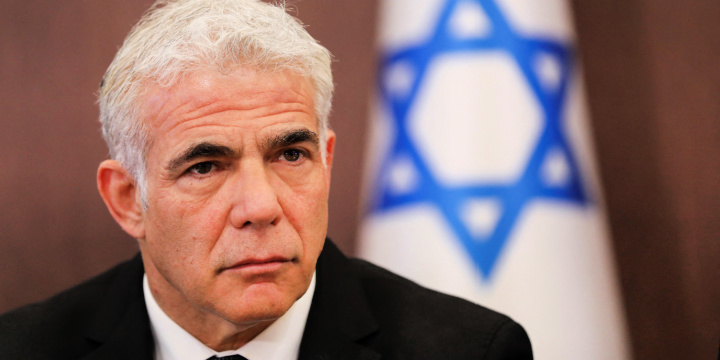‘Right Decision’: Israel Set for New Elections as Fragile Coalition Government Collapses
 by Sharon Wrobel
by Sharon Wrobel

Yair Lapid will become Israel’s interim Prime Minister following the collapse of the governing coalition. Photo: Reuters/Abir Sultan
Israel is paving the way for its fifth election in less than four years, as efforts to stabilize the fragile ruling coalition led by Prime Minister Naftali Bennett finally failed on Monday.
“We are standing here in a difficult moment, but with the understanding that we have made the right decision for Israel,” Bennett said in a televised statement. “A year ago, we formed a good government that had seemed impossible, that stopped the severe leadership paralysis.”
Bennett and alternate Prime Minister Yair Lapid formed a fractious ruling coalition in June last year, the most diverse government in the nation’s history, with eight parties from across the ideological spectrum banding together to bring former Prime Minister Benjamin Netanyahu 12-year tenure to an end. From the start, the diverse coalition was shaky, with Bennett governing with a razor-thin parliamentary majority since Idit Silman, a lawmaker from Bennett’s own Yamina party, resigned in April.
“With little in common other than a desire to unseat Netanyahu and very little to agree on and no ideological coherence, the patchwork coalition of right-wing, centrist, left-wing and Arab parties was doomed to be a temporary arrangement,” Prof. Udi Sommer at Tel Aviv University’s School of Political Science told The Algemeiner. “Bennett as a politician failed to keep his own party together to help stabilize the coalition.”
Bennett vowed that the government in recent weeks has done everything possible to preserve the tottering coalition.
“We turned every stone (…) but our efforts did not bear fruit,” he said.
The decision to call for new elections was to prevent “chaos” and harm to Israeli security, Bennett said, after he concluded that he would not be able to pass the West Bank settler emergency bill due to expire on June 30. That development followed last week’s announcement from parliamentarian Nir Orbach that he would depart the coalition, shifting the ruling bloc to minority status in the Knesset with just 59 seats out of 120 in total.
Should the bill to dissolve the Knesset be passed next week, new elections will likely be held following the Jewish High Holidays in October. In the interim period until a new government is formed, Lapid will become caretaker prime minister and Bennett will be alternate prime minister, according to the coalition agreement.
Speaking at the press conference together with Bennett, Lapid called for a return to the “concept of Israeli unity.”
“What has happened in the past few days, what has happened here tonight, is further proof that the Israeli system is in need of serious change and major repairs,” said Lapid. “Even if we are going to elections in a few months, the challenges we face will not wait.”
“We need to tackle the cost of living, wage the campaign against Iran, Hamas and Hezbollah, and stand against the forces threatening to turn Israel into a non-democratic country,” he added.
If recent Israeli political history is any indication, an interim prime minister could serve for a few months or a number of years before a new government is formed, Prof Sommer remarked.
Meanwhile, for opposition leader Benjamin Netanyahu, Israel’s longest-serving prime minister, the Bennett-Lapid decision presents a “new political lifeline,” Sommer said.
“Netanyahu will give it all to get back into power,” Sommer added. “Right now, it is a coin toss. Israel’s electorate is very volatile due to security concerns and a few months until the next election can change a lot.”
In a video statement, Netanyahu announced that he will “form a national government led by the Likud that will take care of everyone, all citizens of Israel without any exception.”
Israel’s dramatic political upheaval comes ahead of US President Joe Biden’s visit next month.
“Lapid is likely to be hosting Biden during his Israel visit and that might represent an opportunity to strengthen his foreign credentials for his future campaign,” Sommer suggested.
 Iran Sentences Rapper Toomaj Salehi to Death Over 2022-23 Unrest
Iran Sentences Rapper Toomaj Salehi to Death Over 2022-23 Unrest Netanyahu: ‘Antisemitic Mobs Have Taken Over Leading U.S. Universities’
Netanyahu: ‘Antisemitic Mobs Have Taken Over Leading U.S. Universities’ U.S. Decides Against Sanctions on IDF’s Netzah Yehuda Battalion
U.S. Decides Against Sanctions on IDF’s Netzah Yehuda Battalion Israel Says It Is Poised to Move on Rafah
Israel Says It Is Poised to Move on Rafah Israeli Hostage Hersh Goldberg-Polin Seen Alive in a New Hamas Video
Israeli Hostage Hersh Goldberg-Polin Seen Alive in a New Hamas Video Palestinian Prime Minister Announces New Reform Package
Palestinian Prime Minister Announces New Reform Package France: Man Suspected of Abducting, Raping Jewish Woman ‘to Avenge Palestine’
France: Man Suspected of Abducting, Raping Jewish Woman ‘to Avenge Palestine’ Israel Intensifies Strikes Across Gaza, Orders New Evacuations in North
Israel Intensifies Strikes Across Gaza, Orders New Evacuations in North Iran Threatens to Annihilate Israel Should It Launch a Major Attack
Iran Threatens to Annihilate Israel Should It Launch a Major Attack ‘Completely Baseless’: Reports of Mass Graves at Gaza Hospitals are False, IDF Says
‘Completely Baseless’: Reports of Mass Graves at Gaza Hospitals are False, IDF Says



 Israeli Hostage Hersh Goldberg-Polin Seen Alive in a New Hamas Video
Israeli Hostage Hersh Goldberg-Polin Seen Alive in a New Hamas Video Israel Says It Is Poised to Move on Rafah
Israel Says It Is Poised to Move on Rafah U.S. Decides Against Sanctions on IDF’s Netzah Yehuda Battalion
U.S. Decides Against Sanctions on IDF’s Netzah Yehuda Battalion Netanyahu: ‘Antisemitic Mobs Have Taken Over Leading U.S. Universities’
Netanyahu: ‘Antisemitic Mobs Have Taken Over Leading U.S. Universities’ Iran Sentences Rapper Toomaj Salehi to Death Over 2022-23 Unrest
Iran Sentences Rapper Toomaj Salehi to Death Over 2022-23 Unrest